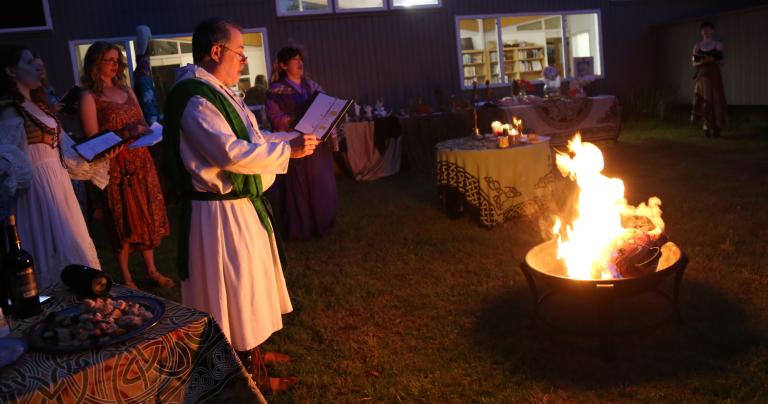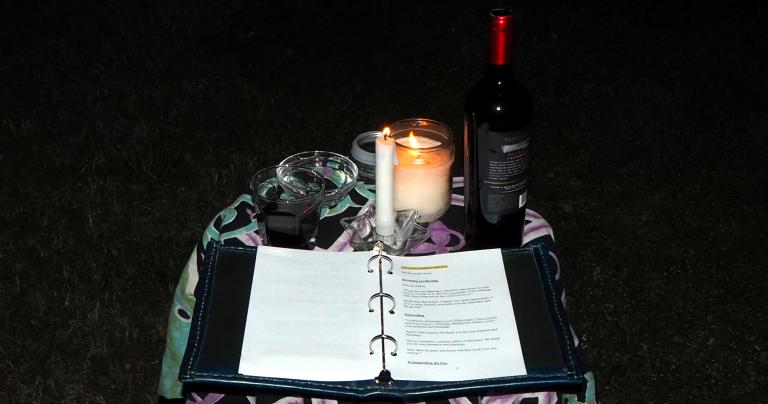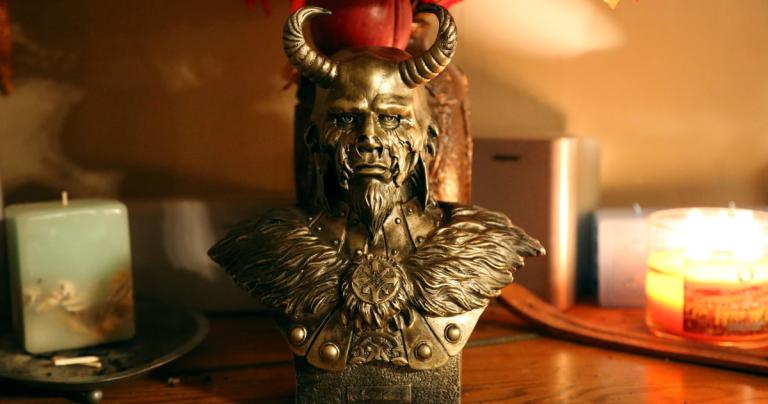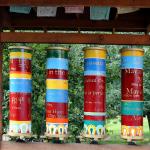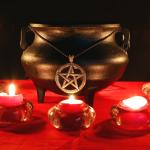In the recent post A Pagan Creed For Non-Creedal Pagans, I said:
If you attend a ritual I’m leading and you pour an offering to Brighid, I’m not going to ask if you believe you’re offering to the Goddess, to the saint, to an aspect of a Great Mother Goddess, or to a metaphor for smithcraft, poetry, and healing. What matters is that you’re pouring an offering to Brighid.
But I also said:
Too many differences and we may not be able to worship together – differences matter.
That raises several questions: what does it mean for Pagans to worship together? What does it take for us to worship together? And why might we not want to worship together, at least not all the time?
What is Pagan worship, anyway?
I still run into Pagans – and a few polytheists – who recoil at the mention of worship. They think worship means groveling in self-debasement. It is not.
Worship – from the Old English weorthscipe – is a recognition and celebration of what we find most worthy. For Nature-centered Pagans that’s Nature herself. For Self-centered Pagans that’s our highest values and virtues, which guide us to our best selves. And for Deity-centered Pagans that’s one or more of the many Gods.
My worship consists of symbolically re-creating the cosmos, inviting various spiritual persons to join the rite, inviting the deity or deities of the occasion to be present, and making offerings as an act of hospitality and reciprocity. In a public ritual the main event usually involves introducing the participants to a God and inviting them to listen for Their presence.
In doing so, we are saying that the Deity of the Occasion is good and worthy, and that what They have to say to us – by whatever means They use – is of value. We are not making any statements about what They are – that’s up to each individual to decide for themselves.
Actions matter more than beliefs
So when we make offerings to Cernunnos, we are saying that Cernunnos is worthy. And if you agree that Cernunnos is worthy then you are in communion (i.e. – in a healthy relationship with) with everyone else who’s doing the same thing. Whether you think Cernunnos is an individual person, an aspect of a God, or a metaphor for Nature is of secondary importance.
As His priest, I’m more interested in what you do than in what you believe. The more you contemplate Cernunnos the more likely you are to live in ways that honor Him and that promote His values. Actions matter more than beliefs.
I’ve had plenty of people attend and participate in my rituals who were Christians or atheists. They’ve all been welcome and they’ve all participated respectfully. I’ve never asked someone to leave a ritual – the only reason I can imagine I would is if someone was behaving disrespectfully. Right action, not right belief.
But I’ve been a part of other rituals that were not open to the public, and where the invitation list was carefully restricted.
Nakedness, intimacy, and vulnerability
I am not Wiccan and I have never participated in a skyclad ritual. If there was a need for ritual nudity I would certainly do it, but so far I haven’t encountered it. But if I did I would want the participants limited to people I know and trust. There is an intimacy in nakedness that has nothing to do with sex.
There is another kind of nakedness that has nothing to do with taking off your clothes.
In the rituals of the kind I lead and participate in, we invite one or more deities to join us. And usually They do. Sometimes this simply means Their presence is easy to feel. But other times Their presence is overwhelming, moving people to do things they otherwise wouldn’t. And sometimes a God takes over a participant and uses their voice to speak audibly to those gathered there.
I can’t imagine being naked in public is any more intimate or vulnerable.
In order to function in that extreme vulnerability, it is necessary that all the participants agree on what they’re seeing, hearing, and experiencing. If I hear words that are harsh and unpleasant – and I have – I can’t be wondering why a friend would say that to me. I have to be confident those are the words of the deity speaking through her.
In this situation, common belief matters.
In an ordinary ritual, it doesn’t matter if someone’s there who I know is a committed atheist. They see things their way, I see things my way, we celebrate the ideals and the actions we have in common.
In an ecstatic ritual, the presence of someone who’s going to question and judge our most sacred and intimate experiences will inhibit the participants. We’ll hold back, rationalize away what we see and hear, and pretend it’s all in our heads, so our atheist friend won’t think badly of us… or say bad things about us afterwards. Perhaps we shouldn’t, but 99% of us will.
And the opportunity for a first-hand experience of a God will be lost.
Theological and political differences
I know Heathens who will not participate in rituals where Loki is invoked. I know Kemetics who will not participate if Set is invoked. I know others in both traditions who believe that not honoring these deities is a best a misjudgment and perhaps a sacrilege.
This is the stuff of religious schism.
Schism isn’t a bad word. If something matters, then it matters enough to do it right. And outsiders don’t get to tell insiders what should matter. Rather than pretending it doesn’t matter, it’s better to form separate groups so everyone can worship and practice as they see fit.
In the wider Pagan community our significant differences are rarely theological – instead they’re political. That says something about the value we place on politics vs. theology, but that’s another rant for another time. I put devotion to the Gods before politics and I’ve never asked anyone how they voted before a ritual, but if you show up wearing a MAGA hat I’m going to assume you’re trying to provoke a response that will be detrimental to an atmosphere of devotion and worship.
The Heathen community is trying to get racists out of their movement, or at least isolate them. I’ve heard multiple stories of people going to inclusive Heathen events, only to be approached afterwards by other guests who were there to recruit for the “folkish” groups. For Heathens, schism isn’t some quaint religious oddity – it’s a necessity.
Our differences matter.
Excommunication is a sharp sword – wield it carefully
For the most part, Pagans do a good job of self-selection. You find a group, you check it out, if you fit you stay and if you don’t you keep looking. I’ve had people join semi-private groups centered around ecstatic practice only to leave when things got a bit too real. That’s fine – that kind of practice isn’t for everyone, and sometimes you don’t know till you see it for yourself.
Self-selection is a good thing. Not every tradition or group is appropriate for every person. The more we agree on, the deeper we can go. But what if we have members in our groups that some people think shouldn’t be there?
I see a lot of Pagans who are eager to unfriend, to block, to shun – to excommunicate – others for reasons that range from deep necessity to childish petulancy. What people do in their private lives is their own business. Often, though, a private break carries over into a wider community and affects many others.
Done well, this can identify and isolate predators and other bad actors. Done poorly it becomes high school cliquishness, with all the harm – to individuals and to groups – that brings.
You and those of your tradition must decide who you will and won’t excommunicate, just as you must decide for yourselves whether or not you should make offerings to Loki or to Set. I encourage you to do so mindfully, dispassionately, and only once you’re in full possession of the facts.
Together where we can, separate where we can’t
In reading over this post I had a flashback to some of the knock-down-drag-out arguments we had between polytheists and atheists in 2015 and 2016. Those arguments weren’t fun, but they were necessary to establish that religious differences are real and they matter. I see no need to re-plow that ground.
At the same time, I think it’s necessary to remember that going deeper into anything – whether that’s religion, magic, art, sports, academics, or anything else – requires us to narrow our focus. That’s one of the themes of Paganism In Depth. That narrower focus means that some people won’t be interested in what we do, some won’t have the necessary skills to do what we do, and some will want to do something very different.
That’s OK. We can still come together for more generic rituals at Pagan Pride Day. We can still come together any other time we have common cause and mutual interests.
But we can’t always worship together. And that’s OK too.


